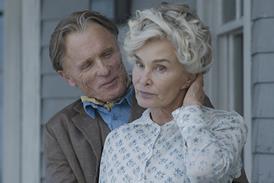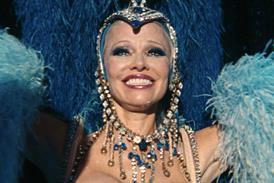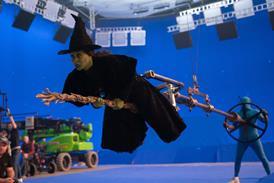Dir. Amos Gitai.Fr-Is-Jor-Bel. 2005. 94mins.
Even his detractors would have to agree that Free Zone,the Cannes competition entry from Amos Gitai, is his most satisfactory picturesince Kippur. The first Israel-Jordan co-production on record, his roadmovie, which features three women each representing a facet of the Middle Eastconflict, is less ideologically insistent and has more space for character andemotion than his usual fare.
Although its historicalprecision and geographic accuracy leave much to be desired and the plot ignoresseveral loose ends, the evidence here is that Gitai has considerably mellowed,occasionally forgoing some of his trademark self-imposed rules.
Gitai's faithful coterie ofadmirers will need little convincing to see his latest feature, but FreeZone also has a strong chance of reaching a wider audience who prefer moreconventionally narrative plots. Natalie Portman's name should also be an asset,although her contribution ends after 15 minutes when Hanna Laslo and HiamAbbass take over with strong and eloquent performances.
Rebecca (Portman), a youngAmerican, devastated after breaking up with her Israeli husband, is taken byhired driver Hanna (Laslo) from Tel Aviv to the Free Zone, an economic tradearea on the border between Jordan and Iraq.
Her former love is owed$30,000 for armoured cars he has delivered to a merchant, known as TheAmerican, and expects to be paid. But all they find on arrival is Leila(Abbas), a Palestinian woman who claims neither the American nor the money isthere.
Leila then drives ahead ofthe women to the nearby farmstead of Mussa Allami, a home for Palestinianorphans established in 1948, promising to introduce them to the mysteriousAmerican.
On arrival the three findthe place ablaze, torched by Arab fanatics who reject any normalization of lifebefore their political goals are achieved. When Leila hears allegations thather son, one of the fanatics, has supposedly taken the outstanding money tohelp the Intifada, she heads with Rebecca and Hanna back to Israel.
At this point Gitai slipsinto his usual style, trying for an impossibly symbolic ending, which may sitwell with his political views but jars with the realist tone he has adopted upuntil this point.
While few audience memberswould disagree that Israelis and Palestinians need to talk to each other, itwould have been better not to have this conclusion sprung on viewers in such anobviously demonstrative way.
Still, Gitai fans will findmany shots to admire, starting with the opening 10-minute long close-up ofPortman crying over her aborted romance. Much of the subsequent picture thentakes place in cars (a tribute to Abbas Kiarostami, one wonders') offering theopportunity for many similar set-ups.
Gitai also makes much use ofa new narrative device to introduce the past, superimposing images of previousevents over the present rather than cutting away for flashbacks.
Of his three femalecharacters, Portman's, once introduced, is very much the bystander. Thedramatic onus is instead first with Hanna Laslo, a popular Israeli entertainer,who delivers her best performance to date as an assertive, energetic,no-nonsense - if at times - blundering Israeli woman.
Then the focus shifts toHiam Abbass, who displays patience, humanity and suffering as a modernPalestinian woman who insists on preserving her individuality and freedom in asociety where it is not taken for granted.
Carmen Maura, supposed tohave a much meatier part, also passes through in one of the superimposedepisodes as Portman's mother-in-law.
There are also severalsatirical touches, including the presentation of the high-handed conduct ofIsraeli border security. Not everyone will be best please at how their fellowcountrymen are presented. Israelis will object again to stories about soldiershaving their way with Palestinian women, while Palestinians will balk at thesight of fanatics wrecking havoc on their own people. But for Gitai, facts areelements to build upon and not necessarily to be respected on their own terms.
Gitai chooses to present thecontemporary face of Jordan through everyday photography rather than anypicture postcard tourist attractions. It may disappoint those who expect even abrief piece of scenery for relief - but then if they know their Gitai, theyshould not be surprised.
Production companies
Agav Films
Agat Films
International sales
Bac Films International
Producer
Nicolas Blanc
Michael Tapuach
Laurent Truchot
Cinematography
Laurent Brunet
Screenplay
Amos Gitai
Marie-Jose Sanselme
Editor
Isabelle Ingold
Yann Dedet
Production design
Miguel Mirkin
Main cast
Natalie Portman
Hanna Laslo
Hiam Abbass
Carmen Maura
Makram Khoury
Aki Avni
Uri Klauzner
Liron Levo
Tomer Russo



















No comments yet